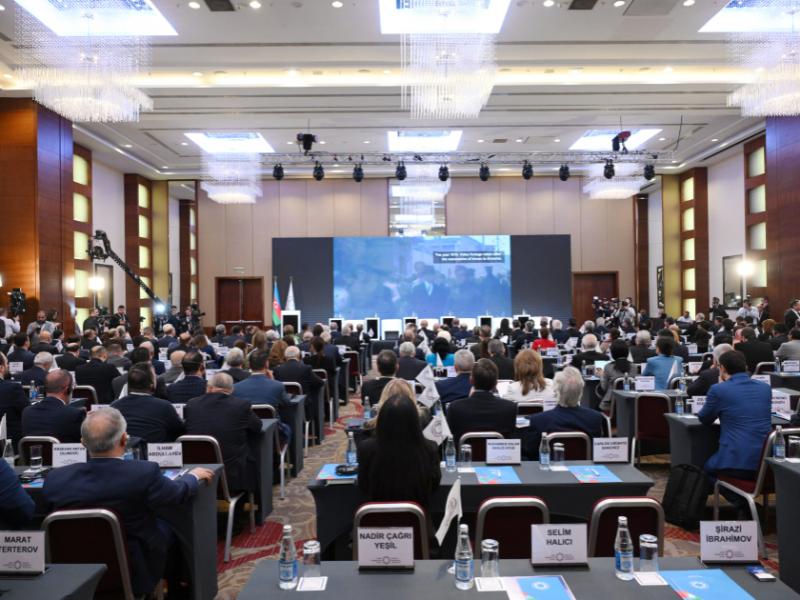International conference on the right of Azerbaijanis to return adopts final document

The Second International Conference on “The Right to Return: Advancing Justice for Azerbaijanis Expelled from Armenia,” organized by the Western Azerbaijan Community, has adopted its final document.
The document, summarizing the discussions held at the conference, was read out at the final session by Jakub Wojciech Korejba, a Polish participant and lead researcher at the Center for Eurasian Studies.
The final document reads: “Over 200 participants from 51 countries, including members of parliament, public and political figures, civil society activists, and academics, gathered at the Second International Conference on “The Right to Return: Advancing Justice for Azerbaijanis Expelled from Armenia” to discuss the issue of the return of Azerbaijanis forcibly expelled from Armenia and the problem of forced displacement on a global scale.
The participants acknowledge that displacement is one of the most serious violations of human rights, and that the forced displacement of Azerbaijanis from Armenia represents a grave injustice that remains unresolved.
The participants emphasize that the right to return is firmly enshrined in international law and recognized as a fundamental human right. The Universal Declaration of Human Rights, the International Covenant on Civil and Political Rights, the Pinheiro Principles, and customary international law are cited as the foundation of this right.
The participants express deep concern over Armenia's refusal to allow the safe and dignified return of Azerbaijanis forcibly expelled from Armenia. They call on the Prosecutor of the International Criminal Court (ICC) to investigate Armenia’s violations of its obligations under international law and the Rome Statute in preventing the return of Azerbaijanis.
The participants stress the importance of restoring property rights as part of the return process. They call on the Armenian government to take the necessary steps to return confiscated or forcibly seized property, compensate for losses incurred during displacement, and address the damages fairly. While acknowledging the importance of compensation for the material and emotional losses suffered by displaced persons, they emphasize that such compensation cannot substitute or deny the right to return to ancestral lands.
The participants express concern about Armenia’s systematic destruction of Azerbaijani cultural heritage, including mosques, graveyards, and historical sites. They view this as an attempt to erase Azerbaijani identity and call for the involvement of UNESCO and other international organizations to assess, protect, and restore this cultural heritage. Participants stress that preserving cultural heritage is crucial for reconciliation and understanding.
The participants recall that Azerbaijanis were the first victims of ethnic conflicts among post-Soviet republics, and the insufficient response from the international community contributed to the emergence of other conflicts. They emphasize that the full restoration of the right to safe return for Western Azerbaijanis could serve as a positive example for resolving conflicts globally.
The participants highlight that justice is essential for reconciliation and lasting peace. They call on Armenia to stop glorifying those responsible for crimes against Azerbaijanis, dismantle structures that perpetuate discord, and engage in constructive dialogue with the Western Azerbaijan Community. They stress that for reconciliation, Armenia must address historical injustices and create conditions for coexistence and mutual trust.
The participants call on the UN and global states to make diplomatic efforts to ensure the safe return of Western Azerbaijanis, and to comprehensively plan and support the return process with adequate resources. They acknowledge the expected challenges in reintegrating returnees and stress the importance of a concerted effort to restore infrastructure, provide humanitarian assistance, and implement long-term development programs in the areas to which Western Azerbaijanis will return.
The participants call on the Armenian government to eliminate its policies and constitutional provisions that hinder regional peace and to embrace opportunities for economic and social cooperation. They note that Armenia’s opening of communications, in line with its commitments, would contribute to shared prosperity and stability in the South Caucasus.
The participants reaffirm their determination to recognize the right to return as a fundamental principle of regional peace and justice. They emphasize that the peaceful, secure, and dignified return of Western Azerbaijanis is not only a policy priority but also a test of collective resolve to ensure human rights and dignity.
The participants express appreciation for the leadership of the President of the Republic of Azerbaijan, Ilham Aliyev, in ensuring the rule of international law, protecting the rights of refugees and internally displaced persons, restoring the liberated territories, and promoting justice and reconciliation. They also express support for the efforts of the Western Azerbaijan Community to return in a peaceful, safe, and dignified manner within the framework of human rights and international law.
This summary reflects the key points discussed during the conference and serves to promote justice for the Azerbaijanis forcibly displaced from Armenia, as well as peace, security, and reconciliation in the region.”



